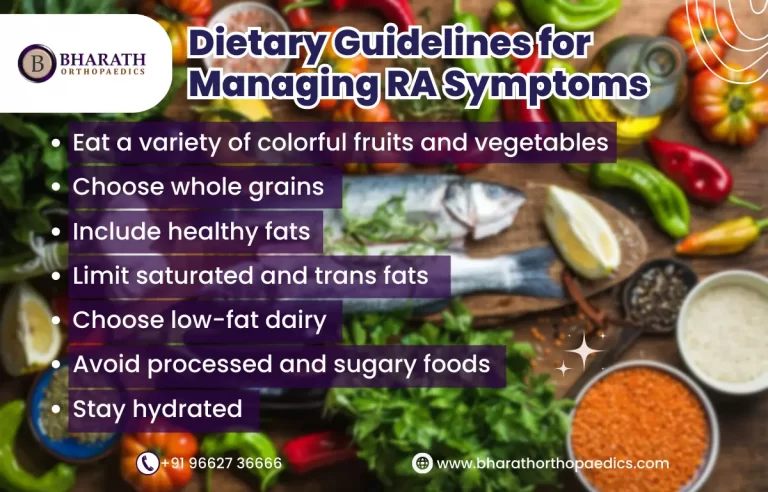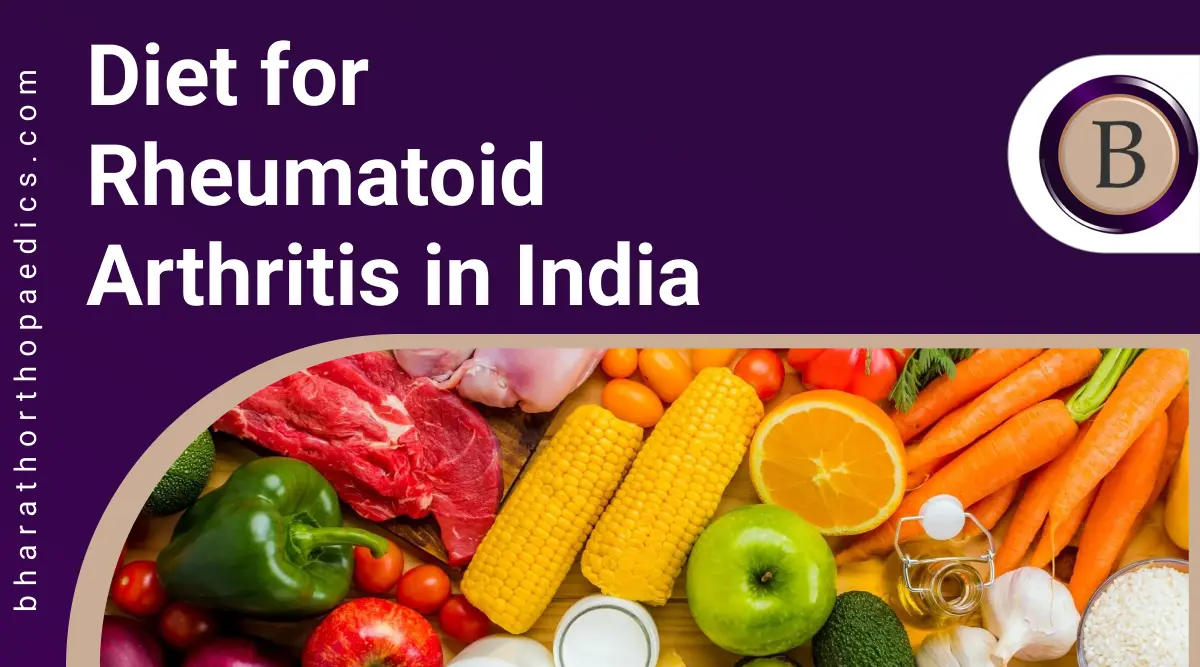Rheumatoid arthritis is a chronic autoimmune disease that causes inflammation and pain in the joints. While there is no cure for rheumatoid arthritis, managing symptoms through medication, physical therapy, and lifestyle changes can greatly improve the quality of life for those living with the condition. One important aspect of diet for rheumatoid arthritis in India is managing rheumatoid arthritis by paying attention to the connection between diet and the development and management of the condition.
The Science Behind the Connection
Inflammation plays a major role in the development and progression of rheumatoid arthritis. Research on diet for rheumatoid arthritis in India has shown that certain foods can either increase or decrease inflammation in the body. A diet for rheumatoid arthritis patients in India rich in anti-inflammatory foods has been shown to help manage symptoms of rheumatoid arthritis. Conversely, consuming foods that increase inflammation can exacerbate symptoms and worsen joint pain and swelling.

The Benefits of a Diet for Rheumatoid Arthritis in India
Anti-inflammatory foods are foods that are believed to help reduce inflammation in the body. These foods diet for rheumatoid arthritis patients in India include:
- Fruits, such as berries, cherries, and oranges
- Vegetables, such as spinach, broccoli, and kale
- Whole grains, such as brown rice and quinoa
- Nuts and seeds, such as almonds and flaxseeds
- Incorporating anti-inflammatory foods into your diet
Meal planning and preparation are key to successfully incorporating anti-inflammatory foods into your diet. Some tips for diet for rheumatoid arthritis patients in India include:
- Incorporating a variety of colorful fruits and vegetables into your meals
- Replacing refined grains with whole grains
- Adding nuts and seeds as snacks or to meals for added crunch
- Including fatty fish in your diet at least two times per week
- The Importance of Hydration in Managing Rheumatoid Arthritis
Staying hydrated is an important diet for rheumatoid arthritis in India that helps in reducing inflammation and managing symptoms of rheumatoid arthritis. Water helps to flush toxins from the body and maintain joint mobility. Aim to drink at least eight glasses of water per day and avoid sugary drinks, such as soda and fruit juice, as they can worsen inflammation.
The Benefits of Omega-3 Fatty Acids for Rheumatoid Arthritis
Omega-3 fatty acids play a crucial role in the management of rheumatoid arthritis. Inflammation is a key factor in the development of rheumatoid arthritis and omega-3 fatty acids have been shown to have anti-inflammatory properties. These essential fatty acids inhibit the production of inflammatory molecules and enhance anti-inflammatory pathways, reducing overall inflammation in the body.
Additionally, omega-3 fatty acids protect joints against damage, improve joint flexibility, and reduce pain, thereby improving joint health. Foods rich in omega-3 fatty acids include fatty fish such as salmon and sardines, flaxseeds and chia seeds, walnuts, and soybeans.
What is the connection between diet and rheumatoid arthritis?
Inflammation plays a major role in the development and progression of rheumatoid arthritis, and certain diet for rheumatoid arthritis in India can either increase or decrease inflammation in the body. A diet rich in anti-inflammatory foods has been shown to help manage symptoms of rheumatoid arthritis.
What are anti-inflammatory foods?
An anti-inflammatory foods diet for rheumatoid arthritis in India is believed to help reduce inflammation in the body. These include fruits and vegetables, whole grains, nuts and seeds, and omega-3-rich foods such as fatty fish.
How can I incorporate anti-inflammatory foods into my diet?
Incorporating an anti-inflammatory foods diet for rheumatoid arthritis in India into your diet can be achieved through meal planning and preparation. Some tips include incorporating a variety of colorful fruits and vegetables into your meals, replacing refined grains with whole grains, adding nuts and seeds as snacks or to meals, and including fatty fish in your diet at least two times per week.
Do’s And Dont’s While Following Diet Plan for Rheumatoid Arthritis
Do’s and Don’ts for following a diet plan for Rheumatoid Arthritis:
Do’s:
- Incorporate Anti-Inflammatory Foods: Include fruits, vegetables, whole grains, fatty fish (rich in omega-3), and nuts, as they can help reduce inflammation.
- Stay Hydrated: Drink plenty of water to maintain joint health.
- Control Portion Sizes: Maintain a healthy weight to reduce stress on joints.
- Consult a Dietitian: Seek professional guidance to create a personalized diet plan.
Don’ts:
- Avoid Processed Foods: Minimize consumption of processed, sugary, and high-sodium foods, which can exacerbate inflammation.
- Limit Red Meat: Reduce intake of red meat, as it may contribute to inflammation.
- Be Cautious with Nightshades: Some individuals may experience worsened symptoms with nightshade vegetables like tomatoes, potatoes, and peppers.
- Excessive Alcohol: Limit alcohol consumption, as it can increase inflammation and interact with some medications.
- Identify Food Sensitivities: Be aware of any specific food sensitivities or triggers that worsen your symptoms, and adjust your diet accordingly.
Always consult with a healthcare professional or dietitian for a diet plan tailored to your specific needs and sensitivities.
Diagnosed with rheumatoid arthritis?
If you have been diagnosed with rheumatoid arthritis, see a rheumatologist for a personalized treatment plan. Medications such as DMARDs and lifestyle changes can help manage symptoms and slow disease progression. Regular check-ups and joint-friendly exercises are important. Early intervention improves outcomes, so treat symptoms such as joint pain, stiffness, and swelling promptly. Work with your healthcare professional for a comprehensive management plan and support in managing life with rheumatoid arthritis.
Is there an RA diet?
Although there is no specific “RA diet”, eating a balanced, anti-inflammatory diet can help manage rheumatoid arthritis. Focus on whole foods, fruit, vegetables, and omega-3-rich fish, and limit processed foods. Some people find relief by avoiding potential trigger foods. Consult a healthcare professional or dietitian for personalized advice, as dietary strategies vary for people with rheumatoid arthritis.
Conclusion
In conclusion, the diet for rheumatoid arthritis in India plays a crucial role in managing symptoms of rheumatoid arthritis. By incorporating anti-inflammatory foods into your diet and staying hydrated, you can help reduce inflammation and manage joint pain and swelling.
It is important to seek medical and nutritional guidance when making dietary changes and to remember that everyone’s needs are different. Work with a doctor or registered dietitian to develop a personalized diet plan that works best for you and your unique needs.
Read also How to Improve Posture.


